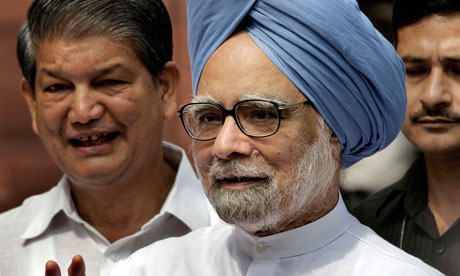
Indian prime minister Manmohan Singh. Photograph: Manish Swarup/AP
Long-awaited laws in India to fight corruption, protect farmers from unscrupulous developers and boost economic growth look less likely to be passed after tumultuous scenes in the national parliament on Monday.
Opposition politicians forced a shutdown within minutes of the start of a new five-week parliamentary term, an indication that the bitter partisan politics dominating in recent months are set to continue.
The lower house was adjourned after the death of a member of parliament during the recess.
The prime minister, Manmohan Singh, and other senior figures in the ruling coalition government, which is led by the Congress party, had appealed for calm and co-operation. Singh, 78, said he hoped the five-week session would be "constructive and productive".
However the opposition has smelled blood in recent months, with an already fragile government weakened by a series of corruption scandals, runaway inflation and the recent terrorist blasts in the commercial capital, Mumbai.
"The government is on the back foot," said Sushma Swaraj, a senior politician with the rightwing Bharatiya Janata party (BJP).
Vinod Mehta, editor of the news magazine Outlook India, said the coming weeks would see "a lively parliamentary ding-dong".
"The opposition has a great deal of ammunition. Every day there is more trouble for the government. But it still has a comfortable majority and so will limp on," Mehta said.
Parliamentary work has ground to a virtual standstill this year amid acrimonious battles over graft and other issues. Many of the 32 laws to be debated in the coming term are deeply controversial, including allowing foreign investment in supermarkets, cutting subsidies and restructuring loss-making state-run utilities. One crucial measure tackles land rights, the source of often violent protests.
Congress party strategists see other proposed laws – such as proposals to share mining royalties with local communities and to expand a scheme to give cheap food grains to the poor – as critical to their chances of consolidating traditional support among hundreds of millions of rural voters before national polls in 2014.
Also the subject of bitter argument is a proposed anti-graft bill that would establish a new watchdog independent of the government. Campaigners cite polls apparently showing that the government's version of the bill is seen by most voters as watered down.
In recent days, a senior Indian economic advisory panel has warned of slowing growth and cut the annual growth forecast to 8.2% from 9%.
Opposition politicians forced a shutdown within minutes of the start of a new five-week parliamentary term, an indication that the bitter partisan politics dominating in recent months are set to continue.
The lower house was adjourned after the death of a member of parliament during the recess.
The prime minister, Manmohan Singh, and other senior figures in the ruling coalition government, which is led by the Congress party, had appealed for calm and co-operation. Singh, 78, said he hoped the five-week session would be "constructive and productive".
However the opposition has smelled blood in recent months, with an already fragile government weakened by a series of corruption scandals, runaway inflation and the recent terrorist blasts in the commercial capital, Mumbai.
"The government is on the back foot," said Sushma Swaraj, a senior politician with the rightwing Bharatiya Janata party (BJP).
Vinod Mehta, editor of the news magazine Outlook India, said the coming weeks would see "a lively parliamentary ding-dong".
"The opposition has a great deal of ammunition. Every day there is more trouble for the government. But it still has a comfortable majority and so will limp on," Mehta said.
Parliamentary work has ground to a virtual standstill this year amid acrimonious battles over graft and other issues. Many of the 32 laws to be debated in the coming term are deeply controversial, including allowing foreign investment in supermarkets, cutting subsidies and restructuring loss-making state-run utilities. One crucial measure tackles land rights, the source of often violent protests.
Congress party strategists see other proposed laws – such as proposals to share mining royalties with local communities and to expand a scheme to give cheap food grains to the poor – as critical to their chances of consolidating traditional support among hundreds of millions of rural voters before national polls in 2014.
Also the subject of bitter argument is a proposed anti-graft bill that would establish a new watchdog independent of the government. Campaigners cite polls apparently showing that the government's version of the bill is seen by most voters as watered down.
In recent days, a senior Indian economic advisory panel has warned of slowing growth and cut the annual growth forecast to 8.2% from 9%.
No comments:
Post a Comment